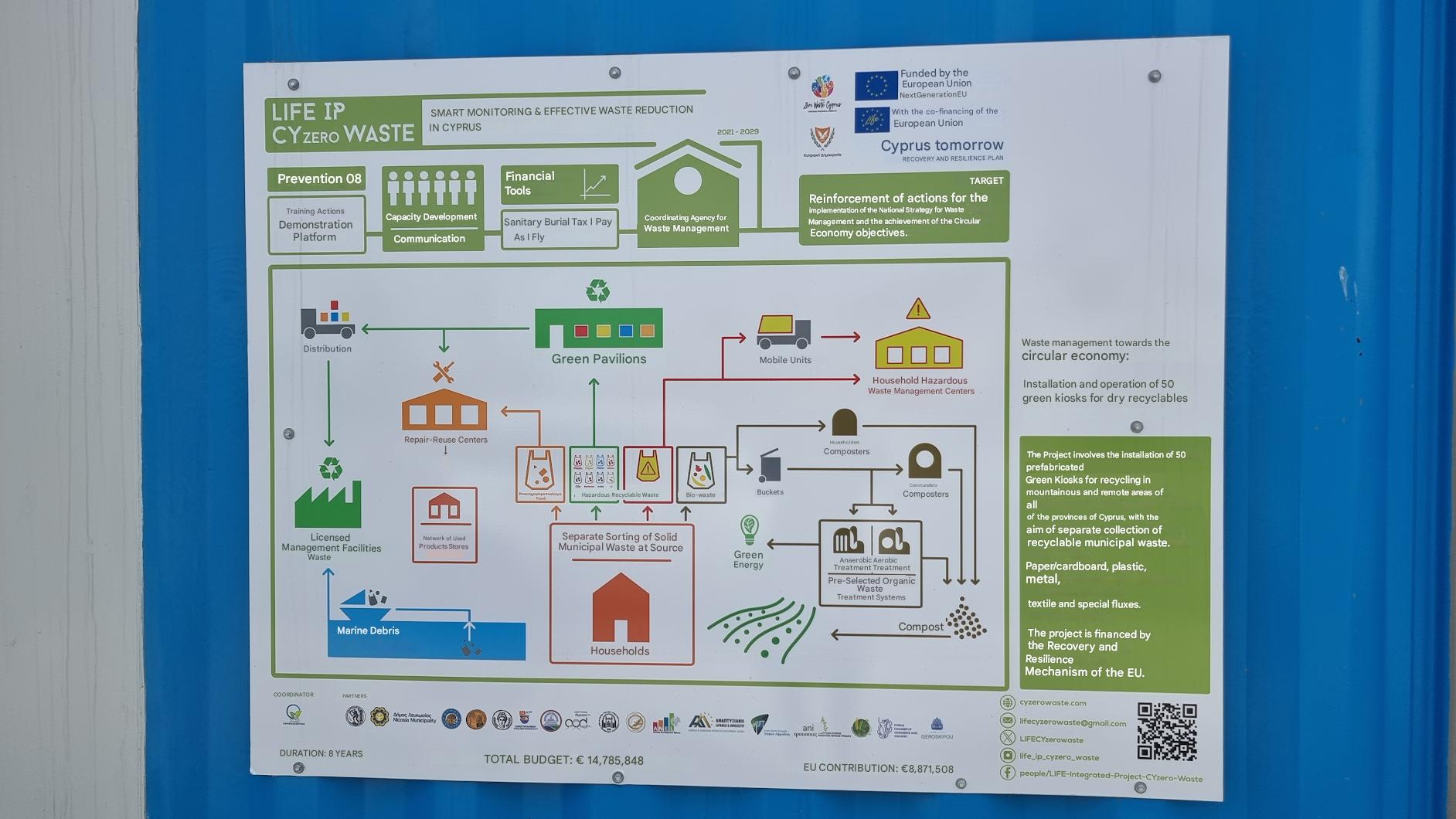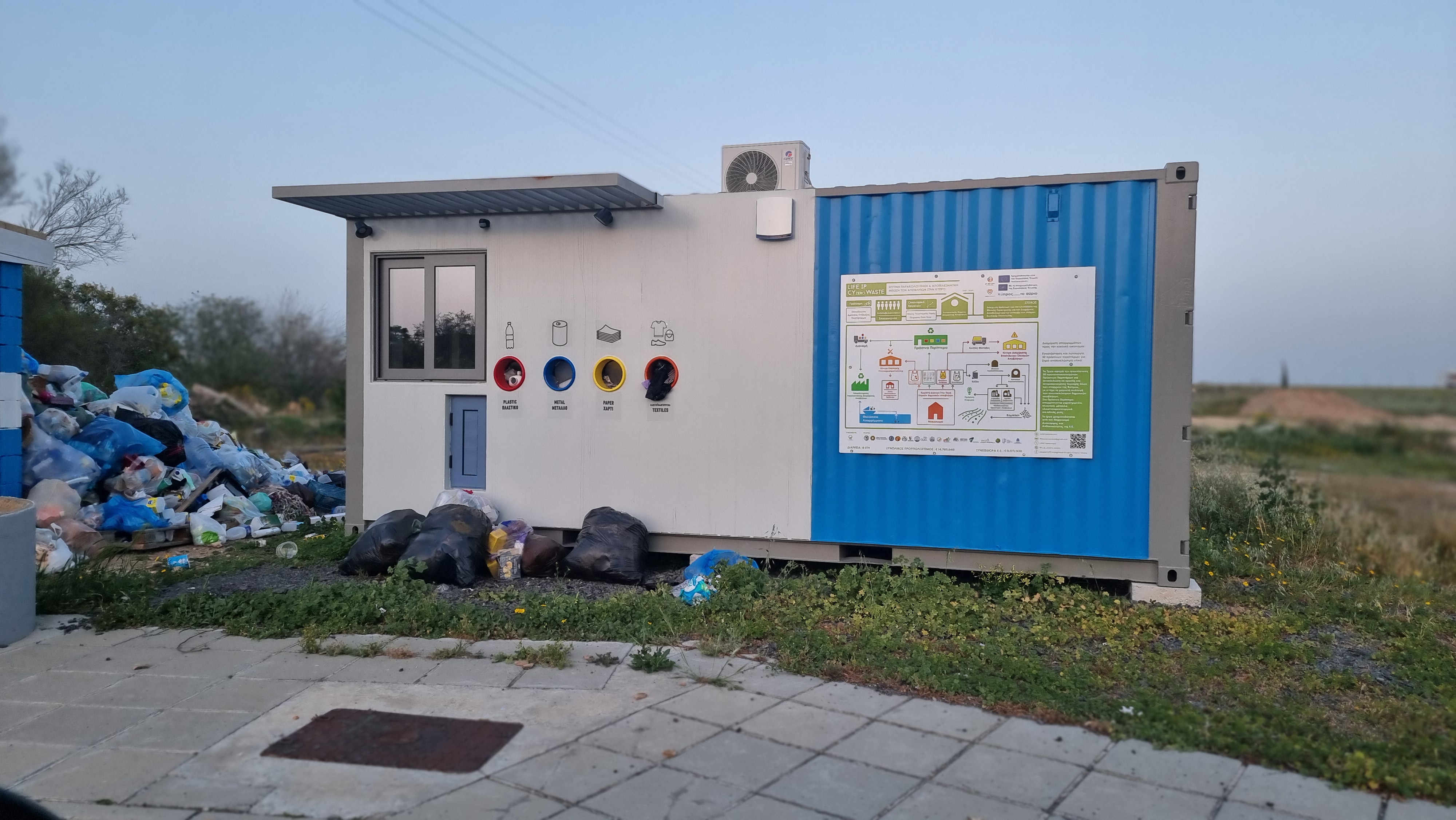Rural recycling points left behind
At first glance, the Green Kiosk recycling spot in Mammari village seems like a modest effort toward environmental responsibility – until your gaze shifts to the side, where towers of rubbish bags are stacked high, slowly bursting open one by one.
At the top of the recycling point, a bold sign proclaims ‘Smart Monitoring and Effective Waste Reduction’. In reality, the scene looks less like a beacon of environmental innovation, but more like a quiet monument to neglect.
“It’s a real shame, the rubbish just keeps piling up and nobody seems to bother to pick it up,” says Mammari resident Maria who lives nearby.
Ambition meets reality
Introduced in 2024 as part of a €3.3 million initiative funded by the Environment Department, the installation of the Green Kiosks aimed to transform rural recycling.
The project was promoted as part of Cyprus’ national strategy to increase recycling rates from a low 16 per cent toward the European Union’s target of 55 per cent by 2025.
As of October 2024, a total of six such kiosks were installed in the Nicosia district of Agrokipia and in the villages of Farmakas, Ayios Trimithias, Palaichori Morphou, Kalopanayiotis – and finally the one in Mammari.
The initial plan was to roll out 50 kiosks across villages from Nicosia to Famagusta over a 25-month period with the kiosks designed as compact sorting centres for recyclable and reusable materials such as paper, plastic, glass, metal and textiles.
Beyond waste collection, the kiosks were intended to act as local hubs for public awareness and participation in the circular economy in remote areas that are not served by waste management collectors. However, it seems that this ambition is far from being realised.

A sign affixed to the metal container at the recycling point explains the initiative – or at least aims to. The design is far from user-friendly: heavy on graphics, light on clear information and visually overwhelming. To put it plainly, it leaves more questions than answers.
This leads to the question as to whether making such information accessible and easy to understand should be a priority – especially with the aim of wanting to raise public awareness on the topic. Since the project is partly funded by taxpayer money, it is only reasonable to expect that the public is given enough information to understand and take part properly.
Zero waste and zero responsibility
The sign points to “Cyzerowaste” as responsible for the kiosks, listing social media contacts and a website. However, the last post on X is from 2023, and the Instagram page doesn’t exist. Cyzerowaste hasn’t replied to Cyprus Mail’s emails over the last two weeks. By Thursday, CM was told they were “working on an answer”, that was yet to be received upon the publishing of this story.
Supervisor of the Nicosia Green Points – a separate initiative -Lambros Papalambrianou instead gave some clarification. “The green kiosks are not under our responsibility, but we did provide employees to manage them,” he says. “However, as far as I know, we no longer do that.”
He suggests contacting the Environmental Department for further details, which we had already done multiple times, with all emails, reminders and reminders to the reminders remaining unanswered.
Papalambrianou also points to a Green Point that he says is nearby the village as an alternative. Mammari resident Maria, in response to this highlights a key issue: it’s still a 15-minute drive away and recyclables have to be individually sorted once there.
And while this might not seem much, it is indeed a significant problem, as the goal should be to make recycling and environmentally friendly living accessible to everyone, and a 15-minute drive is simply too far for many residents to make it a practical option.
Since starting this article, Maria tells us that some of the garbage has been collected, but it was rapidly piling up again. “Apparently the problem is electricity since those containers are actually crushers,” she says.
A waste management issue
The Green Kiosk issue point to a bigger picture: waste management simply is not working. Across Cyprus, the image of a green, circular economy is carefully presented in public messaging, but in reality, it often falls short. Recycling targets have been set, but the infrastructure to support them remains patchy, confusing and underwhelming.
Cyprus recycles just 16 per cent of its municipal waste marking one of the lowest rates in the EU. A 2022 European Commission report ranked Cyprus among the worst in waste management, citing illegal dumping, poorly maintained collection points, and a lack of public awareness as contributing factors.
Drivers in Cyprus will be ever too familiar with highway signs warning of fines for illegal dumping of more than €800, at the same time residents who’ve lived here for any length of time are also likely to have encountered illegal waste dumps in the countryside which often remain ignored by authorities. Between April and July 2024 alone, 820 illegal rubbish dumps were identified.
A confusing green landscape
Recycling can turn into a bit of an undertaking in Cyprus. With recycling points often scattered and, like much else here, usually only accessible by car.
Imagine walking 20 minutes in the blistering summer heat with just a few empty wine bottles – a hardly feasible challenge.
Part of the confusion lies in the terminology: Green Dot, Green Point and Green Kiosks. While all sound environmentally promising, each refers to a different system, with different rules, managed by different entities.
Green Dot Cyprus is a non-profit, collective recycling system supposedly established to manage and promote the recovery and recycling of packaging waste in compliance with Cypriot laws, serving over 88 per cent of the population.
Green Points, on the other hand, are free drop-off centres for recyclable materials not collected with household waste. The public can dispose of up to 50kg per visit at one of the 23 points on the island, with items like glass, aluminum, furniture, and electronics accepted, and staff assist with proper disposal.
Rural communities often lack nearby access to Green Points – but that’s not the issue. After all, we have the Green Kiosks, right?






Click here to change your cookie preferences